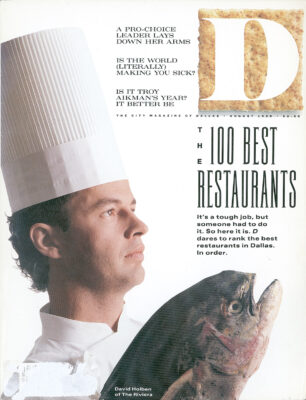The first time I met Dallas’s most strident feminist, Charlotte Taft, in 1989, the situation was strained, to say the least. D was hosting 500 women at the Adolphus Hotel, and the prospect of luncheon speaker Gloria Steinem’s keynote address had the place absolutely charged with anticipation.
During a break, a staff member pulled me aside to tell me that someone was putting pro-abortion fliers on all the tables and that some of the guests were offended. That someone, it turned out, was Charlotte Taft.
Though the incident was resolved without conflict, it haunted me long afterwards. First, there were Taft’s eyes, wide and shimmering with purpose. More troublesome were the intruding fliers themselves. We had decided to steer the conference away from a discussion of abortion. That Taft’s commitment to her point of view drove her to proceed without apology both annoyed and impressed me. By her actions she seemed to say that the cause was bigger than common courtesy, more important than decorum. Though I was offended, 1 admire people who are so sure of their convictions that they willingly risk personal attack to see them carried forward.
So I was struck again-hard-by reading “The Abortionist’s Tale” (page 50), Sally Giddens’s profile of Taft and the changes she has undergone. No less passionately, Taft has laid down her arms. The battle over abortion rights has sucked too much negative energy out of its leading local firebrand. Tired of fighting a reactionary battle shaped by someone else’s agenda, Taft says simply, “You can only do so much.” And what she will do from here on will be defined by her vision of women’s needs, her view of choice. Charlotte Taft’s metamorphosis is that much more compelling in the context of the larger view of the women’s movement, which has also, to a degree, laid down its arms. Some have seen the continued proclivity of women to marry, to give birth, and to question “having it all,” as proclaiming an early death to feminism. Indeed, bra-burning is hardly the stuff of the nightly news. The time when the world began en masse to question inequities between the sexes is some two decades past. Much has changed, but much has not. As feminist writer Vivian Gomick wrote recently in The New York Times Magazine, “We can see easily enough what we have done to ourselves, but we cannot act on what we see.”
Yet the struggle for women’s rights, the battle against sexism, and yes, the fight for legal abortion are very much alive and well, if not always in the headlines. Changes wrought during those early, more radical days have irrevocably altered the way we live our lives. “That influence is there to be seen,” Gomick writes, “on the street, in the movies, in the bedroom, in the books being written, the conversations overheard. . . “
In Dallas, the results are dramatic and visible. Women penetrate every stratum of power, save that rare pocket above the “glass ceiling1’ of corporate executivedom. Who can say that feminism has died when City Council member Harriet Miers debates a housing settlement with City Attorney Analeslie Muncy, with mediating influences by City Manager Jan Hart and Mayor Annette Strauss? These four women have accepted power without questioning whether, as females, they are entitled to it. Countless others with less recognizable names and smaller dominions do the same every day.
This is a period of relative calm, and calm can be soothing, but it can also be dangerous. Violence against women, women in poverty, teenage pregnancy, drug and alcohol addiction are very real problems that have yet to command broad-based governmental support or action. Abortion rights, of course, continue to galvanize women-on both sides. If that difficult issue keeps women politicized, other issues that unique-ly affect them will continue to attract debate.
Those who know her will surely miss Charlotte Tafl at the front of the protest march. But the struggle will go on, however quietly.
Get our weekly recap
Brings new meaning to the phrase Sunday Funday. No spam, ever.
Related Articles

Arts & Entertainment
DIFF Documentary City of Hate Reframes JFK’s Assassination Alongside Modern Dallas
Documentarian Quin Mathews revisited the topic in the wake of a number of tragedies that shared North Texas as their center.
By Austin Zook

Business
How Plug and Play in Frisco and McKinney Is Connecting DFW to a Global Innovation Circuit
The global innovation platform headquartered in Silicon Valley has launched accelerator programs in North Texas focused on sports tech, fintech and AI.

Arts & Entertainment
‘The Trouble is You Think You Have Time’: Paul Levatino on Bastards of Soul
A Q&A with the music-industry veteran and first-time feature director about his new documentary and the loss of a friend.
By Zac Crain


